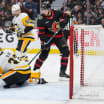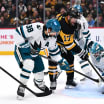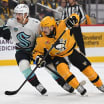Penguins' Jim Paek Made History 30 Years Ago
The defenseman became the first Korean-born player to play in the NHL
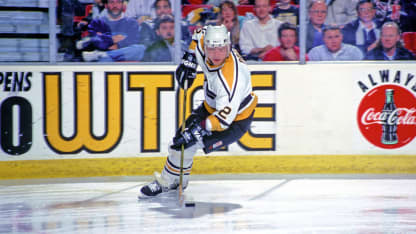
"They didn't even have my number, which was 2, so I had to wear No. 3 for my first game," Paek, a defenseman, recalled with a laugh. "And I remember my first shift in the offensive zone, standing at the blue line, my knees were shaking. Boy, was I nervous. And then, you're a fan. You're on the ice with Mario Lemieux and all these guys, and you're looking around, like can I have your autograph?"
As if it wasn't memorable enough, the game also holds a special significance, as Paek became the first Korean-born player to play in the National Hockey League.
"That really didn't cross my mind at the time," Paek said. "It was more of 'I'm a hockey player and I want to play in the NHL.' But then with people recognizing the achievement and the Korean community rallying around you, you're like, wow, okay, yeah - I'm very proud to be Korean-born and to play in the National Hockey League."
Paek was born in Seoul, South Korea on April 7, 1967, the youngest of four children. When Jim was a year old, his parents Bong-hyeon and Kyu Hui Paek moved the family to the Toronto area, where they quickly learned that hockey was a way of life in their new home of Canada.
"If you wanted friends, you had to play hockey," Jim said. "My older brother played, and you want to be like your older brother. So I was following him to the rink, carrying his sticks and just loving the game. I had that passion ever since I was a small kid."
And although his parents may not have known much about the sport, they couldn't have been more supportive. As Jim came up through the Toronto youth hockey system and later joined the Oshawa Generals of the Ontario Hockey League, there was one season in juniors where he played 107 total games, including preseason and postseason contests.
His mother went to 106 of them.
"She got snowed out of Sault Ste. Marie, so she couldn't make it up there for that one game," Paek said. "That's the kind of support I got. So I was very fortunate and blessed. That allowed me to accomplish my dreams, my goals. You need that. You need somebody that will believe in you that you're able to do it, and my parents supported me 100 percent."
However, being raised in a Korean household meant Bong-hyeon and Kyu Hui placed a huge emphasis on education, and it could be difficult at times for Jim to balance his schoolwork with athletics.
"My older sister's a doctor, my brother's in pharmaceuticals, my younger sister's a lawyer," Paek said. "Here I am, a hockey player and a hockey coach now (laughs). So being raised in that family, education was very important. My dad made me put into my first NHL contract that I would have four years of tuition and books paid for. So I had that education package, and that came off of my salary into a degree or schooling that I never used, just to satisfy my dad (laughs)."
Paek signed that deal after Pittsburgh selected him in the ninth round (170th overall) of the 1985 NHL Draft, which was held in Toronto, so he and his family were able to attend.
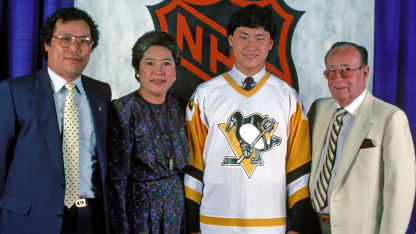
He turned professional for the 1987-88 season with the Muskegon Lumberjacks of the International Hockey League, which was Pittsburgh's minor-league affiliate at the time. Paek played alongside Phil Bourque for that first season, and the two became fast friends.
"He knew that I had been around for a while, and I was playing defense at the time," Bourque recalled. "And he was like a sponge. He would ask a million questions. I was really into working out off the ice and he would be like, hey, can I jump in with you? He was just so excited to be a pro hockey player. Hard-working guy and could never do enough to prepare for a game. I enjoyed his enthusiasm."
Paek would go on to play a total of three full seasons for Muskegon before finally making the team out of training camp and getting the opportunity to make his debut with Pittsburgh at the start of the 1990-91 season. His teammates truly couldn't have been more thrilled for Paek.
"There's a certain amount of those guys where you just pull for them," Bourque said. "Because he's a good guy, and he earned it. He was a ninth-round pick. Nothing was given to him. You knew he probably went through some racial things, as there weren't many Asian hockey players, never mind Korean players. To go through everything he went through and to just be such a humble, quality person is incredible."
"We knew what Jimmy was trying to achieve," said Bob Errey, another Penguins teammate from that era. "He didn't have the easiest path getting to the promised land. He had a lot of trial and tribulation, playing in the minors and so many years in Pittsburgh."
Paek played two more games on Oct. 16 and Oct. 20, but since he was ninth on the depth list, Penguins head coach Bob "Badger" Johnson told the 23-year-old defenseman that he needed to be playing. So Johnson sent him to play with the Canadian national team for most of the year.
"Then Craig Patrick called me back up for the playoffs as an Ace," Paek said. "I still remember Badger telling me, 'Jim, keep smiling, keep working hard, you never know what's going to happen.'"
And sure enough, three defensemen - including Paul Coffey - went down with injuries, which meant Paek got the nod for the Patrick Division Final series versus Washington.
"That advice Badger gave me allowed me to play through that playoffs and contribute in the final series, and you couldn't write a story better than that," Paek said.
The story goes like this: Paek scored his first-ever NHL goal in Pittsburgh's Stanley Cup-clinching victory of the Final, an 8-0 win over Minnesota in Game 6, with Lemieux earning the lone assist. He fished the puck out of the net and gave it to Paek, who still has it to this day. And also to this day, Bourque and Errey still can't contain their excitement when reminiscing about that goal.
"It's funny, whenever I watch the games over again the two goals I remember are the first one, (Ulf Samuelsson) and the seventh one, Jimmy Paek," Bourque said. "You're winning 6-0 at the time, and Jimmy freakin' Paek scores. It was a pretty goal. I remember he hung on and drew it around Jon Casey and then just popped it in. And we're jumping up and down on the bench like a bunch of little kids."
"For him to score that goal, I can tell you quite honestly - and I mean it in all sincerity - I don't think we were happier for anybody," Errey added. "We were giddy. When he scored, it was unbelievable. It was the best thing ever. It was the punctuation mark on the whole night. Jimmy!"
Paek played a total of eight playoff games that spring and went on to become the first Korean-born player to have his name etched on Lord Stanley's chalice. The next season, Paek appeared in 49 regular-season games for Pittsburgh and 19 postseason games as he helped the team win their second straight championship.
Paek is a perfect example of how many pieces it takes to put together a championship puzzle. He reminds Bourque of Chad Ruhwedel and the role the defenseman currently plays for the Penguins.
"Badger realized that this is a steady guy, this is a guy I can put in when needed, I don't have to worry about him," Bourque said. "The same with Scotty Bowman next year, too."
Paek and Paul Stanton, who was also a rookie defenseman in 1991, are the two names that stand out to both Bourque and Errey when thinking back on those teams.
"You had guys like Randy Hillier and Grant Jennings and guys like that who established themselves as NHLers, but a lot of times guys like Paul Stanton and Jim Paek got the nod and got the jersey ahead of the veteran guys because maybe they were a little more mobile, and overall just safe players," Bourque said.
"They were guys that I think were so instrumental in in the importance of those Stanley Cups," Errey said. "When you bring up the names, I keep thinking about them. Because they played roles. They played big roles."

© Bruce Bennett Studios
Paek played a total of six seasons in the Penguins organization, appearing in 170 regular-season NHL games and 27 playoff games, before getting traded to Los Angeles during the 1993-94 campaign.
"It was an incredible experience," said Paek, whose Penguins jersey is currently on display in the Hockey Hall of Fame. "I love Pittsburgh, I love the organization. And you know, when you have success, everything is great. But even during bad times, it was great too. I still have great friends in Pittsburgh.
"I go back there after all these years and the people still recognize you. It's an incredible town, a real hockey town and sports town, and they're real appreciative of their athletes. The support you get from the city is very special. I'll never forget all the people when we were going for that playoff run, how the people just embraced us."
After retiring from a 16-year professional career in 2003, Paek transitioned behind the bench. His first coaching jobs were with the World Hockey Association 2 and in amateur hockey before joining the Red Wings organization as an assistant with Grand Rapids, their American Hockey League affiliate, in 2005. He remained there for nine seasons, winning another Stanley Cup in 2008, before an opportunity came along in 2014 that he couldn't refuse.
Paek accepted a position as the director of hockey for the Korea Ice Hockey Association (KIHA) and head coach of the South Korean men's national team, moving with his wife and children to Seoul, where they have been ever since.
"I've always kept in touch with Korean hockey, and it was always a dream of mine to help Korean hockey grow and develop," Paek said. "And this was an opportunity for me to coach them in the Olympics."
As if appearing in their first Olympics wasn't enough, it actually happened on home soil, as the 2018 Winter Games were held in PyeongChang, South Korea. Under Paek's leadership, the team earned that berth after finishing second in the 2017 Division I Group A tournament and qualifying for the top division.
"To see him on the bench at the Olympics, I tell you what, you couldn't wipe the smile off my face," Bourque said. "It just kind of came full circle, good things happen to good people type of thing. Where you're just like, damn right man, I'm so damn proud of you! I talk to him at least once or twice a year, and he's just so happy with what he's doing. And you just pull for a guy like that and hope that he has continued success, because he deserves it. He's earned it."
Paek says there's still a long way to go when it comes to growing the game in South Korea, as they face a number of different challenges.
As of right now, there are only about 3,000 registered hockey players out of a population of around 45 million. There's also just a handful of ice rinks in the country, which means they are battling for ice time with the more popular sport of short-track skating.
But Paek is working to convince the government about the benefits of hockey, and in the meantime, is enjoying his time with the men's national team. He's proud of how far they've already come, and can't wait to see where they go from here.
"I couldn't ask for a better bunch of guys," Paek said. "These guys, they work hard for you, and that's all a coach can ask for - is for their players to be sponges and to absorb everything and work extremely hard. And they've shown that through our international competitions. We've hit some milestones here in Korea that are unchartered waters. So now, it's continuing sustaining that. It is absolutely amazing how the hockey part of this country has grown."










